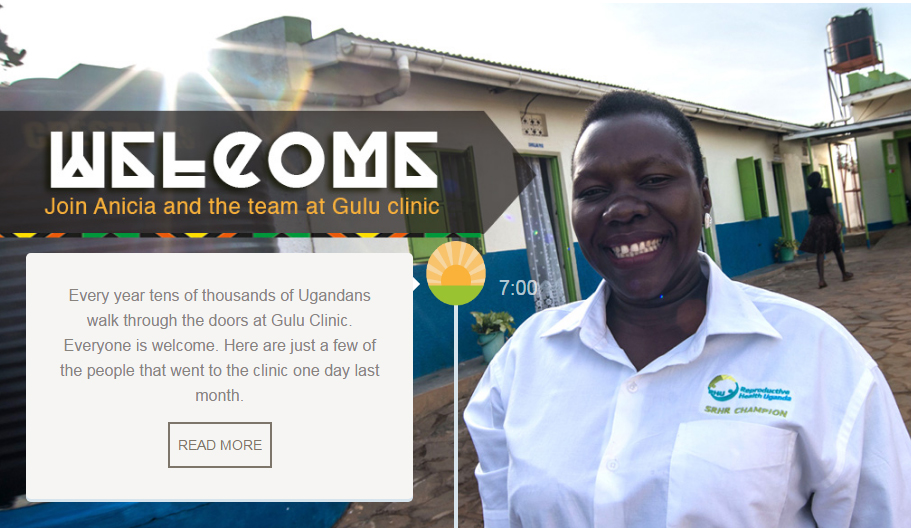Spotlight
A selection of resources from across the Federation

HIV Theory of Change
Our HIV Theory of Change is to clarify the goals and vision of IPPF’s HIV programme and to articulate the different pathways and strategies IPPF uses to contribute towards its HIV goals and vision.
Filter our resources by:


| 11 October 2016
Changing lives in Nigeria
Nigeria has Africa’s biggest population. And it’s still growing at 3% a year. A lack of family planning is one reason – many women and girls want contraception – but like millions around the world – can’t get it. But that could be about to change, thanks to a pilot project run by Planned Parenthood Federation of Nigeria (PPFN), IPPF’s national member. It’s proving a huge success. This is its story, told by the women whose lives it has changed and the people working to change them. LAUNCH THE INTERACTIVE STORY
| 11 October 2016
Putting Sexuality back into Comprehensive Sexuality Education: tips for delivering sex-positive workshops for young people
Millions of young people around the world are not getting the kind of education they need and deserve when it comes to understand their sexuality. This document is designed to complement Putting Sexuality back into Comprehensive Sexuality Education: making the case for a rights-based, sex-positive approach, and it aims to give practical tips for putting IPPF's right-based, sex-positive approach, into practice.

| 11 October 2016
Putting Sexuality back into Comprehensive Sexuality Education: making the case for a rights-based, sex-positive approach
IPPF took initiative to develop this discussion paper after advocates and programmes identified a pattern whereby sexuality was becoming marginalised within, or entirely excluded from, CSE programmes and advocacy efforts. We believe that sexuality education programmes are worth investment and implementation because they empower, build self-esteem, competence and confidence and lead to better health and well-being for the individual young people they reach. This publication is complemented by Putting Sexuality back into Comprehensive Sexuality Education: tips for delivering sex-positive workshops for young people.

| 01 October 2016
Gulu clinic: A one stop shop of services in rural Uganda
Uganda has one of the highest fertility rates in the world, and as a result, it also has one of the most youthful populations - more than half of Ugandans are under the age of 15. Approximately, 755,000 unintended pregnancies occur annually out of which 297,000 result in unsafe abortions. We are working hard on the ground to tackle these issues. Our Member takes the approach of offering people as many services as possible to get all health needs met in the same place. See a day in the life of the staff and clients of Gulu clinic, Uganda.
| 16 September 2016
Fulfil! Guidance document for the implementation of young people's sexual rights (IPPF-WAS)
Translating the sexual rights of young people into practice not only involves raising awareness among young people for them to claim their rights, but working with duty bearers, such as health providers, educators and policy makers for them to fulfil these rights in law and in services. As adolescence is a time of gradually gaining responsibilities, implementing the rights of adolescents specifically involves a dynamic process of striking a balance between protecting them while respecting their autonomy and promoting their empowerment. With this in mind, IPPF and the World Association for Sexual Health developed Fufil!. This guide addresses the critical opportunities to implement young people’s sexual rights in a global context and provides specific guidance for policy makers, health providers and educators.
| 05 September 2016
How to improve young people’s access to safe abortion - Bosnia Herzegovina: Using a buddy system
Young people face unique barriers when seeking accurate information about abortion, and in accessing abortion services. This series showcases strategies implemented by IPPF Member Associations that have successfully reduced these barriers and increased young people’s access to abortion information and services. In this short summary from Bosnia and Herzegovina, they provide a comprehensive strategy on using buddy systems in the context of sexual and reproductive health (SRH) services, which is a process where a nominated volunteer or staff member - the ‘buddy’- supports a client throughout their engagement with the service. The strategy, outlines the key steps needed for successful implementation and highlighting key lessons learned to consider in taking this strategy forward. This guide can be used by programme managers and implementers to help design and inform strategies to ensure that young people are enabled to access the necessary support and services they need in the event of an unwanted pregnancy.















